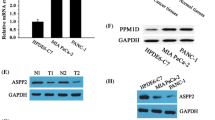Abstract
The molecular regulation of the growth of pancreatic carcinoma (PCC) is complicated and not defined yet. Here we show that the cysteine-rich protein 61 (Cyr61) levels were significantly higher in PCC than in the adjacent nontumor tissues from the same human patient. Overexpression of Cyr61 enhanced the proliferation of PCC cells, while inhibition of Cyr61 decreased the proliferation of PCC cells. Further analysis showed that Cyr61 seemed to activate phosphatidylinositol 3-kinase (PI3K) but not extracellular-related kinase/mitogen-activated protein kinase (ERK/MAPK) signaling pathway in PCC cells, which subsequently induced nuclear exclusion of a major cell cycle inhibitor, p27, to increase cell proliferation. Taken together, these findings reveal the molecular basis underlying Cyr61-regulated PCC proliferation, suggest a potential role of Cyr61 in PCC growth, and highlight Cyr61 as a novel target for PCC therapy.





Similar content being viewed by others
References
Han H, Von Hoff DD. Snapshot: pancreatic cancer. Cancer Cell. 2013;23:424–424 e421.
Lau LF. CCN1/CYR61: the very model of a modern matricellular protein. Cell Mol Life Sci. 2011;68:3149–63.
Chen Y, Du XY. Functional properties and intracellular signaling of CCN1/Cyr61. J Cell Biochem. 2007;100:1337–45.
Chaqour B, Goppelt-Struebe M. Mechanical regulation of the Cyr61/CCN1 and CTGF/CCN2 proteins. FEBS J. 2006;273:3639–49.
Terada N, Kulkarni P, Getzenberg RH. Cyr61 is a potential prognostic marker for prostate cancer. Asian J Androl. 2012;14:405–8.
Menendez JA, Mehmi I, Griggs DW, Lupu R. The angiogenic factor Cyr61 in breast cancer: molecular pathology and therapeutic perspectives. Endocr Relat Cancer. 2003;10:141–52.
Cheng TY, Wu MS, Hua KT, Kuo ML, Lin MT. Cyr61/CTGF/Nov family proteins in gastric carcinogenesis. World J Gastroenterol. 2014;20:1694–700.
Yin JH, Shi WD, Zhu XY, Chen Z, Liu LM. Qingyihuaji formula inhibits progress of liver metastases from advanced pancreatic cancer xenograft by targeting to decrease expression of Cyr61 and VEGF. Integr Cancer Ther. 2012;11:37–47.
Shi W, Meng Z, Chen Z, Luo J, Liu L. Proteome analysis of human pancreatic cancer cell lines with highly liver metastatic potential by antibody microarray. Mol Cell Biochem. 2011;347:117–25.
Shi WD, Meng ZQ, Chen Z, Lin JH, Zhou ZH, Liu LM. Identification of liver metastasis-related genes in a novel human pancreatic carcinoma cell model by microarray analysis. Cancer Lett. 2009;283:84–91.
Ye Q, Cai W, Zheng Y, Evers BM, She QB. ERK and AKT signaling cooperate to translationally regulate survivin expression for metastatic progression of colorectal cancer. Oncogene. 2014;33:1828–39.
Lieber M, Mazzetta J, Nelson-Rees W, Kaplan M, Todaro G. Establishment of a continuous tumor-cell line (panc-1) from a human carcinoma of the exocrine pancreas. Int J Cancer. 1975;15:741–7.
Xiao X, Gaffar I, Guo P, Wiersch J, Fischbach S, Peirish L, et al. M2 macrophages promote beta-cell proliferation by up-regulation of SMAD7. Proc Natl Acad Sci U S A. 2014;111:E1211–20.
Acknowledgments
This study was supported by the National Science Foundation of China (Grant no. 81273955).
Conflicts of interest
None
Author information
Authors and Affiliations
Corresponding author
Rights and permissions
About this article
Cite this article
Shi, W., Yin, J., Chen, Z. et al. Cyr61 promotes growth of pancreatic carcinoma via nuclear exclusion of p27. Tumor Biol. 35, 11147–11151 (2014). https://doi.org/10.1007/s13277-014-2423-x
Received:
Accepted:
Published:
Issue Date:
DOI: https://doi.org/10.1007/s13277-014-2423-x




